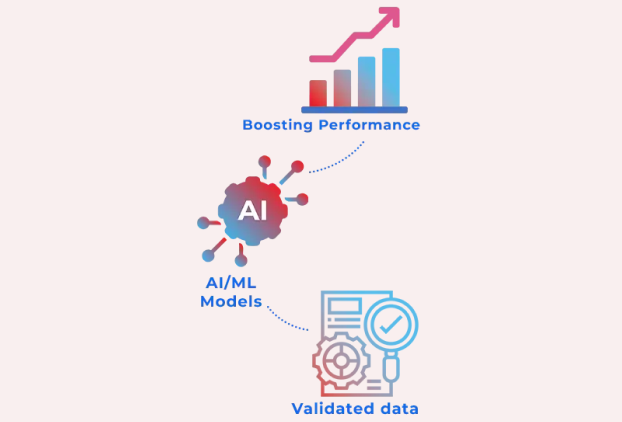Ensure Precision with AI Model Validation
Have a model validation project in mind? Let’s connect

Just as humans learn and adapt, artificial intelligence (AI) and machine learning (ML) models evolve through continuous training and refinement. Similarly, the critical aspect that separates exceptional models from the ordinary lies in the meticulous process of validation. AI Model Validation is an essential step that ensures the accuracy, reliability, and applicability of AI and ML models across various domains. In short, model validation is a collection of procedures and actions designed to guarantee that an ML/AI model meets its intended functions, including the end user’s convenience. While testing the model is a crucial step in the validation process, validation goes beyond that.
How AI Model Validation can ease further processes?
An invalidated or inadequately validated model may result in incorrect predictions. Thus, model validation helps in:

Boosting performance
A thorough review of the AI model provides opportunities to improve model performance in current and upcoming versions. Moreover, data varies gradually over time, which might lead to models performing worse than they did during training. A model's retraining after validation can aid the seamless workflow.

Getting assurance
External validation significantly boosts AI/ML model credibility. By providing a detailed report on data source, quality, population, and processing, it offers valuable insights, thereby making complex models more user-friendly. This comprehensive 360-degree assessment ensures better usability and understanding.

Reducing Bias
Another crucial component of a model assessment is making sure a dataset is unbiased and implementing strategies for correcting biased datasets. An in-depth review of the data source, data quality, population, and data processing are all essential components of an assessment, as bias often finds its way into the data.

Accuracy Enhancement
The criterion for evaluating the precision of AI and ML models is fundamentally model validation. By thoroughly analyzing both data inputs and outputs, it ensures that the model's predictions closely match actual observations. Moreover, this rigorous process helps identify potential discrepancies and enhances the overall reliability of the model's performance.

Risk Mitigation
Model validation is especially vital in critical sectors such as finance, healthcare, and autonomous systems. By ensuring rigorous validation, predictive models are made more reliable, therefore guarding against severe consequences that may arise from inaccuracies.

Generalization Capability
Validation not only guarantees the optimal generalization of AI and ML models over a wide range of datasets, but it also ensures that these models can perform reliably across various settings and circumstances. Consequently, this feature is crucial for establishing the models' adaptability and robustness in real-world applications.
Applications of Model Generation
We must reduce risk in every innovation and production deployment. Here are some use cases showing the importance of model validation in various sectors.
Financial Predictions
Accurate predictions are prominent in the finance sector. Consequently, model validation ensures that AI and ML models used for predicting market trends or investment outcomes are reliable and free from biases. Moreover, this validation process is essential for building trust with stakeholders and maintaining compliance with regulatory standards. As a result, it helps financial institutions make informed decisions based on robust data analysis and minimizes the risks associated with inaccurate forecasts.
Healthcare Diagnostics
Validating models in healthcare ensures the precision of diagnostic tools. Furthermore, it guarantees that AI and ML models provide accurate predictions for disease identification and treatment recommendations. In addition, thorough validation helps in safeguarding patient safety by minimizing the risks of misdiagnosis and inappropriate treatment. Thus, reliable validation processes are essential for healthcare professionals to trust the AI systems that support their decision-making, ultimately leading to better patient outcomes.
E-Commerce Interaction
Model validation ensures accurate, personalized recommendations, robust fraud detection, and seamless consumer interactions. Moreover, it optimizes AI and ML models for enhanced performance in e-commerce. As a result, businesses can better understand customer preferences and behaviors, leading to improved user experiences. In addition, validated models help in quickly identifying fraudulent activities, thereby protecting both the company and its customers. Consequently, a rigorous validation framework is essential for maximizing the effectiveness and reliability of AI applications in the dynamic e-commerce landscape.
Autonomous Vehicles
Model validation is crucial for autonomous vehicles to ensure pedestrian and passenger safety. Specifically, the rigorous process used in testing confirms that the models can accurately identify and react to various real-world situations. Consequently, this ensures robust performance, reliability, and increased safety under diverse conditions. Moreover, thorough validation helps in mitigating risks associated with misinterpretation of data, ultimately contributing to safer transportation solutions. In addition, validated models instill greater confidence in the technology, paving the way for broader acceptance and deployment of autonomous systems in everyday life.
Supply Chain Optimization
Model validation is critical in supply chain management, ensuring accuracy in forecasting and stock optimization calls. In particular, AI and ML models play a vital role in optimizing logistics, warehouse operations, and overall supply chain performance. By validating these models, organizations can ensure reliable decision-making, minimize errors, and enhance operational efficiency. Furthermore, effective validation processes contribute to better inventory management and demand forecasting, allowing businesses to respond swiftly to market changes. Ultimately, this leads to improved service levels, reduced costs, and greater customer satisfaction in the supply chain landscape.
Energy Consumption Forecasting
In the energy sector, model validation is paramount for accurate consumption forecasting. Specifically, validated AI and ML models play a crucial role in predicting energy demand, optimizing resource allocation, and improving overall energy efficiency. As a result, this ensures reliable planning and cost-effectiveness while promoting sustainable energy management practices. Moreover, effective model validation helps organizations anticipate fluctuations in energy consumption, enabling them to respond proactively and maintain a balanced energy supply. Ultimately, a robust validation framework leads to more informed decision-making, enhancing the reliability and sustainability of energy operations.
AI Model Validation Solution Implementation

Tailored Validation Techniques
Macgence therefore implements a diverse set of validation methods tailored to different ML models, specifically considering group and time-indexed data to select the most appropriate techniques. Moreover, this approach ensures that every model is rigorously tested and validated, thereby optimizing accuracy and reliability.

Continuous
Monitoring
The company thus establishes protocols for ongoing monitoring and maintenance, ensuring that the models remain reliable, accurate, and unbiased throughout their lifecycle. Furthermore, these protocols are designed to adapt to evolving data, thereby guaranteeing sustained performance and fairness over time.

Bias Mitigation
Strategies
Macgence therefore incorporates strategies to identify, measure, and mitigate biases within models, thereby promoting fairness and equity in AI-based decision-making processes. Moreover, these strategies ensure that AI outcomes are ethically aligned, fostering responsible innovation in every application.
Use Case Scenario of AI Model Validation
Security Enhancement through Validation Techniques
Macgence places a significant focus on identifying and addressing potential security vulnerabilities within ML/AI models. As part of the validation process, we include comprehensive checks to prevent data leaks and ensure the confidentiality and privacy of sensitive information. Moreover, data anonymization or pseudonymization measures are employed prior to entering the training data into the models. This approach not only safeguards sensitive data but also aligns with stringent privacy regulations, ensuring a secure and compliant AI development process.
Reliability Assessment and Understanding Model Behavior
The validation framework aims to thoroughly analyze the reliability of ML models. Macgence performs in-depth assessments to gain a comprehensive understanding of model behavior, strengths, weaknesses, and limitations. Consequently, this understanding aids in interpreting model outputs effectively and recognizing any biases, drift, or errors that may occur during deployment. By ensuring this level of insight, Macgence helps businesses deploy reliable and efficient AI models that consistently deliver accurate results.
Preventing Concept Drift through Routine Maintenance
The validation framework emphasizes regular testing and maintenance to prevent concept drift. Although initial validation might not directly catch the drift, Macgence implements ongoing validation strategies and routine model checks to detect deviations in model behavior over time. Moreover, proactive maintenance practices ensure that the model’s output remains aligned with its intended predictions, thereby safeguarding the accuracy and reliability of AI systems throughout their lifecycle.
Bias Detection and Mitigation Strategies
Macgence integrates bias detection mechanisms into the validation process to effectively identify and rectify biases present within the algorithms or training data. By doing so, we ensure fairness and equity in model predictions, thereby contributing to a more inclusive and unbiased AI environment. Furthermore, this approach ultimately strengthens the ethical foundation of AI systems, fostering trust and reliability among users. In addition, our commitment to addressing bias enhances the overall performance of AI models, enabling them to deliver more accurate and equitable outcomes across diverse applications.
Why Choose Macgence for Your
Managed Model Generation?


 Wide Industrial Coverage
Wide Industrial Coverage

 Security and Confidentiality
Security and Confidentiality

 Dataset Customization
Dataset Customization

 Exceptional Workflow
Exceptional Workflow

 Affordable Quick Services
Affordable Quick Services

Maximize your AI models with Macgence
We're here to help with
any questions
Get In touch
Maximise Potential with Macgence’s
Data Generation and Collection Services
powering AI projects and driving innovation.
